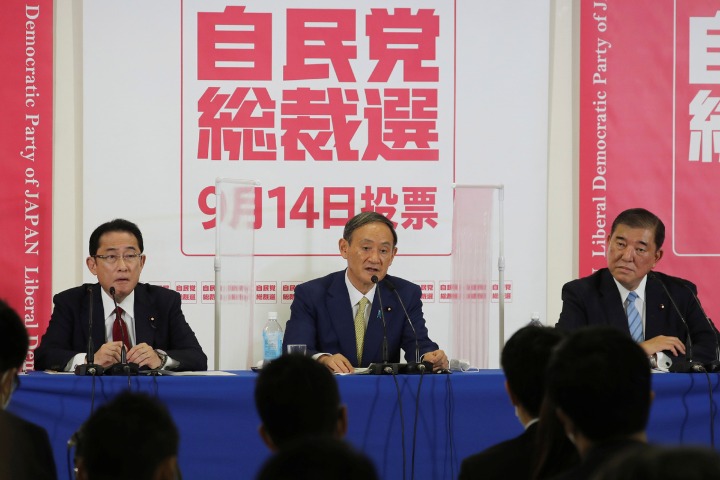TOKYO, Sept 9 (NNN-NHK) – Campaigning officially kicked off Tuesday, for the ruling Liberal Democratic Party’s (LDP) top post, with three candidates vying for the position to succeed Prime Minister Shinzo Abe.
Abe is stepping down due to a recurrent health issue that also brought his first tenure as prime minister to an abrupt end in 2007.
The race is between Yoshihide Suga, 71, Japan’s top government spokesperson and Chief Cabinet Secretary, Shigeru Ishiba, 63, a former defence minister, and Fumio Kishida, 63, the LDP’s policy chief.
The candidates will be making their pitches ahead of the leadership election, to be held next Monday. The new prime minister will be announced at an extraordinary Diet session, to be convened on Sept 16.
The winner of the election is almost certain to become the next prime minister, owing the LDP’s dominance in both chambers of Japan’s bicameral parliament.
Suga, who has the backing of the majority of LDP lawmakers, promised to continue with Abe’s economic policies and approach to tackling the COVID-19 pandemic.
He said, if he was picked to succeed Abe he would choose reform-minded people and specialists to join his Cabinet.
“Amid this national crisis, we cannot afford a political vacuum. I will carry on the work of Prime Minister Abe and hope to move further,” Suga said, in a speech, at the party’s headquarters.
He said, only when the COVID-19 pandemic has been brought under control would he think about dissolving the lower house of parliament for a snap election.
Suga also said, he would create a digital agency, owing to the need for medical examinations related to COVID-19, to be conducted online and administrative procedures and education to be digitalised.
Kishida, meanwhile, said, he wanted to focus on redressing earning imbalances in society, and the need to tackle the spread of COVID-19, while balancing economic issues.
“I realise the significance of the power of listening to the people in politics,” Kishida said.
His campaign platform is based around ideas, such as promoting research into artificial intelligence, space and marine science, through the creation of a “Japan Innovation Fund” and implementing regulatory reforms on data use, while establishing a “Data Agency.”
Kishida, who is also a former foreign minister, said, he aimed to improve Japan’s sustainability by tackling the declining birthrate, promoting renewable energy and restoring fiscal health.
For his part, Ishiba, who has been a vocal critic of Abe, said, he wanted to chart a direction away from Abe’s policies.
He said, he wanted a “great reset” and to “rewrite the blueprint” of Japan, adding that, the nation “cannot survive the next era without it.”
He said, if elected he planned to create more jobs and increase living standards in rural areas, by raising incomes and by decentralising the Tokyo-centric economy.
He also said he was not thinking about a snap election as members of the lower house should serve out their terms.
The party decided to hold a scaled-down version of the leadership election, so that Abe’s successor could be selected quickly, without creating a vacuum or causing distraction from the government’s efforts to combat COVID-19.
In the scaled-down vote, 394 Diet members will cast ballots and a total of 141 votes will be cast by three delegates each from the country’s 47 prefectural chapters.
Due to the pandemic, the candidates will be making their campaign pledges and outlining their policies online and during TV appearances.– NNN-NHK






